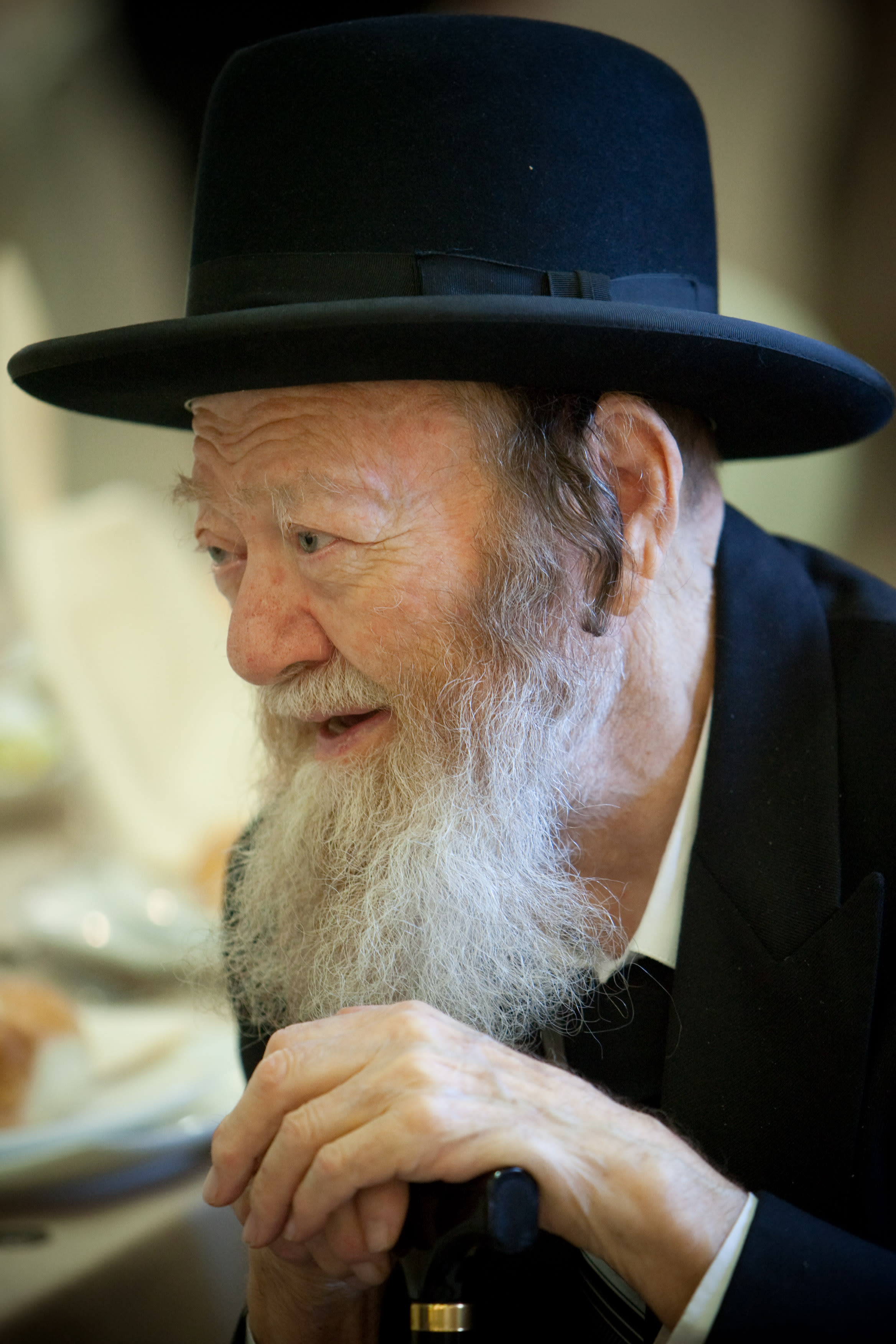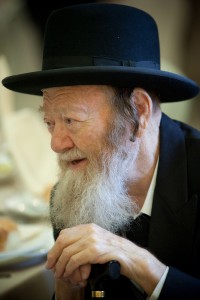No one likes to talk about death. The subject, like politics and religion, is taboo, which is why when I first heard the words of Rebbe Nachman of Breslov – that remembering the day of death will make us happy – I thought the statement ludicrous.
But then I read Rabbi Yechiel Michel’s classic work, “Gesher Hachaim,” The Bridge of Life, which discusses how This Life is a passageway between two worlds.
Rabbi Yechiel Michel tells a story of twin boys in their mother’s womb, waiting the moment of birth. “I tell you,” says one, as the contractions grow in intensity, “the ending will be agony, and then, once the abyss opens, there is nothing. We are finished. It’s all over!” He bursts into bitter tears.
The second twin is shocked. “Oh no, my friend!” he responds. “The ending is just the beginning. It’s not finished. We are entering a world of light!”
But the first twin just scoffs at him. “That’s ridiculous,” he retorts, “It’s obvious that it’s all over. It was all a waste of time.”
Although the analogy is obvious, there is one crucial difference between entering This World and leaving This World. In the womb, the fetus does nothing except receive nourishment in preparation for life. It’s a passive existence. But This World is a world of action. It’s a time of opportunity to overcome what might appear to be insurmountable challenges, accomplish the seemingly impossible, actualize our potential and grab every opportunity to perform a good deed or mitzvah. In other words, to live life to its fullest.
And that means staying focused, remembering that life is finite, and that the seeming abyss is really the beginning of the future.
Rabbi Nissan Aharon Tucazinsky, son of the author of “Gesher Hachaim” and head of Etz Chaim, Jerusalem for over fifty years, left This World on January 10, 2012. He was one of the rare individuals whose life was focused on living – really living. At a memorial evening held in Jerusalem, the Rabbi’s wife, Rebbetzin Chava Tucazinsky, spoke about her husband’s final days. In seeing how a tzaddik prepares for death, we can learn how to live our lives to their fullest.
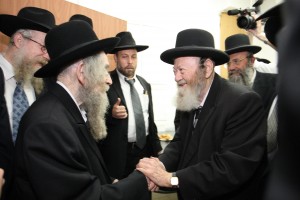 It’s so hard to believe that thirty days have already passed since the Rabbi left This World. I still feel — so strongly — that he is with me. I walk into the house, and I expect to feel a sense of emptiness, but it’s not empty. The walls, the ceilings, the books – they are saturated with my husband’s Torah; his Torah is still here! The Rabbi is still here!
It’s so hard to believe that thirty days have already passed since the Rabbi left This World. I still feel — so strongly — that he is with me. I walk into the house, and I expect to feel a sense of emptiness, but it’s not empty. The walls, the ceilings, the books – they are saturated with my husband’s Torah; his Torah is still here! The Rabbi is still here!
This morning, thirty days after the Rabbi’s passing, we, the entire family, went to his grave for the Memorial Service. I wanted to recite a few chapters of Psalms before beginning the Service, and opened the book at random to the verse, “Give thanks to the Lord because He is good, for His kindness endures always.” When I read those words, I felt as if the Rabbi was speaking to me, for he was constantly quoting that verse. During the years that he was sick, there were nights that he would scream in agony, “Give thanks to the Lord because He is good, for His kindness endures always.” When I asked him about that, he pointed out that the word “always” means in every situation.
When the Rabbi was first diagnosed with his illness, he had to undergo a terribly painful procedure. In the midst of excruciating pain, he asked the doctor, “Doctor, am I allowed to laugh?” He later explained his reason for being so happy, for he now understood a new aspect to that verse in Psalms: The Lord is righteous in all His ways and kind in all His deeds. “Hashem is completely right that I have to go through this pain, and even though it’s agony, it’s completely for my benefit,” he explained. So, too, are all the other painful experiences that we go through in life. Every difficult thing that happens to us is a G-d-sent gift. It was given with loving kindness, and although it might be extremely challenging, it’s for our benefit.
During the last few years of his illness, when it was agonizingly difficult for the Rabbi to walk, he insisted on going to shul. It was a battle for him to go down the stairs. I would walk after him, carrying a chair, so that he could rest on the landing. On the street, he’d take a few steps and have to sit down before continuing. But he always told me that it was worth all that effort to be able to pray with a minyan! He would often say, “When I pray at home, my prayers are deeper and longer, and I am able to express the meaning of each and every word. Yet that doesn’t compare to praying with a minyan!”
In the last few months of the Rabbi’s life, the yeshiva sent ten boys to our house each morning, so the Rabbi wouldn’t have to leave the house to pray with a minyan. He always began praying before the boys arrived. When they’d come, they’d don their tefillin in absolute silence because they wanted to listen to his every word.
I loved to watch the Rabbi studying Torah. When he found the answer to a question that puzzled him, he would bash the table with joy. He would literally sing from happiness!
PREPARING FOR DEATH
During the last two years of the Rabbi’s illness, we openly discussed the fact that since death could come at any time, we had to be prepared. We discussed everything that had to be done. About three months before his passing, he asked the children to come to the house and, stating no more than “life is very short,” he gave them instructions how to take care of many different family and community matters, both spiritual and material.
Gradually, gradually, he prepared us for our parting. By Chanukah, the Rabbi was 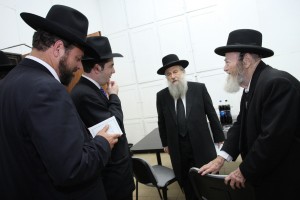 extremely weak and told me, “All my strength now lies in the spiritual realm.” Yet, although he was focused on preparing himself spiritually for the transition, he emphasized that it’s a tremendous mitzvah to guard one’s health, and continued with all the many painful treatments and did everything possible to take care of his body.
extremely weak and told me, “All my strength now lies in the spiritual realm.” Yet, although he was focused on preparing himself spiritually for the transition, he emphasized that it’s a tremendous mitzvah to guard one’s health, and continued with all the many painful treatments and did everything possible to take care of his body.
Very often, the Rabbi was in too much pain to sleep at night, so he’d get up and study Torah. It was the most beautiful sound in the world! In the dark of night, I’d hear his wonderful singing as he chanted the Gemara, and I’d remain awake to listen.
The last Shabbos of his life, he mustered all his strength to pray, and then he sang Kiddush. He sang it so loudly that everyone in the entire department heard it! During the Shabbos meals, he insisted on tasting everything, l’kavod Shabbos kodesh, even though, by that point, it was extremely difficult for him to eat.
At the conclusion of Shabbos, I asked him if he wanted to make havdoloh, but the son of one of the other patients insisted on doing it for us, and for the first time ever, he agreed to let a stranger make havdoloh for him. Afterwards, he asked me several times, “When are we going to make havdolah?” but at the time I thought he was confused and didn’t realize that he was referring to our imminent physical separation.
Monday morning, less than 24 hours before the Rabbi passed away, he donned tefillin, making sure, as always, that they were perfectly centered. Then he prayed in a clear voice, and his words were filled with meaning. When he finished, and I helped him back into the bed, he requested that we disturb him as little as possible, as he wants but one thing: to spend his remaining time in This World talking with G-d. That entire day he sat communicating with the Almighty, preparing himself for the coming hours.
Toward evening, the wife of the patient in the next bed came to visit her husband, but he was too sick to respond. She was inconsolable, and sat at her husband’s bedside, sobbing, repeating over and over, “Aharon, this is Leah, your wife. Don’t you recognize me? Aharon, speak to me. Please, Aharon, speak to me,” and then she burst into tears and got up to leave. As she passed the Rabbi’s bed, she automatically mumbled, “A refuah sheleima; get well soon.” The Rabbi stopped his prayers to speak with her. He blessed her, encouraged her and then continued talking with her until he saw that she was smiling. This was only hours before he passed away.
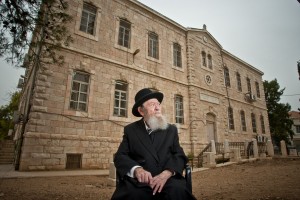 After the woman left, the Rabbi blessed me, and, through me, all the children. Then he said, “I am returning home now.” I responded, “The doctors said that maybe you’ll be able to go back home on Friday,” but he persisted, “No, no! I’m returning home NOW!”
After the woman left, the Rabbi blessed me, and, through me, all the children. Then he said, “I am returning home now.” I responded, “The doctors said that maybe you’ll be able to go back home on Friday,” but he persisted, “No, no! I’m returning home NOW!”
I responded, “Do you know where your home is?” At this, the Rabbi laughed and said, “Where is YOUR home?”
I answered, “In Achvah, with you.” Achvah is the name of our small neighborhood.
Then, with incredible gentleness – a gentleness I will never forget – he said, “You go back to Achvah, the Achvah will come to me. I am going home.”
I understood. He didn’t want me to be there at the end.
It was only later, when I looked up the word “Achvah” in the Shushan dictionary, did I realize what he had been alluding to. Although Achvah is usually defined as “harmony,” it can also mean, “the uncovered truth.” He was hinting to the fact that he was going home to the World of Truth.
Before exiting the room, I said, “I’ll leave you in the hands of our eldest son.”
“Gei gezunteheit, go in good health,” were his final words to me.
I returned home.
The Rabbi and our eldest son learned Torah together throughout the night. Then he made the confession and passed away with the words of the Shema on his lips.
*****
It was his father’s birthday.
My husband, the Rabbi, was a living Torah. Last night, when the entire family – the children, the grandchildren, the great grandchildren, and, yes, the great-great grandchildren in their carriages – came to learn Mishnayos in his memory, it was so very obvious that he, and his Torah, will live forever. And if we follow in his footsteps, so will we.
Rebbetzin Chava Tucazinsky will be in New York between June 13-27. To arrange for her to speak to your group, please contact Debbie Shapiro at debbie@etzchaim.co.il.
The words of this author reflect his/her own opinions and do not necessarily represent the official position of the Orthodox Union.

